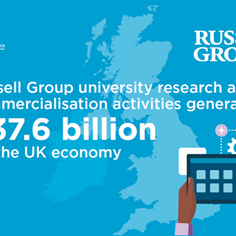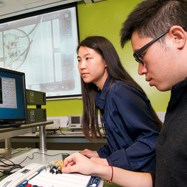Research-intensive universities generate nearly £38 billion for UK economy through research, innovation and the creation of new businesses, new analysis reveals
28 February 2024
A new report by London Economics, assessing the economic impact of the 24 Russell Group universities, found that for every £1 of public funds invested in research at these institutions, more than £8.50 was generated for the UK economy – as a result, the impact of their research and commercialisation activities equated to £37.6billion in 2021/2022.
Analysis showed that the research and commercialisation activities of the 24 universities, such as the creation of new spin-out companies,wider knowledge exchange and Intellectual Property licensing across all four nations helped to support more than a quarter of a million (254,000) jobs, twice as many as in the chemical and pharmaceutical manufacturing industries combined.
The report shows how the universities contributed to economies in every single region and nation of the country, delivering research and innovation in sectors ranging from medicine to sustainable energy and the creative industries. This is in addition to the economic impact generated by wider productivity spill overs, teaching and education-related activities, and the fees and spending from international students.
Now, the Russell Group is urging the Government to maximise the economic potential of the UK’s research-intensive universities by ensuring at least 3% of GDP is invested into R&D by 2030.
The Group, which represents 24 leading research-intensive universities, notes that such a commitment by current and future Governments would not only bring the UK in line with other top research nations but also deliver further benefits to the UK economy in years to come.
In a letter to the Chancellor ahead of the Spring Budget, the Group asked the Government to use the Budget to deliver on its existing commitment to invest £20bn in R&D by 2024/25.
Dr Tim Bradshaw, Chief Executive of the Russell Group, said:
“These findings demonstrate the immense value our universities add in every single corner of the UK. The data clearly shows that investing in R&D and innovation at Russell Group universities reaps huge benefits for local economies and communities, with hundreds of thousands of jobs created and new enterprise supported, thanks to high quality research across a range of disciplines.
“Russell Group breakthroughs are helping accelerate efforts to reach Net Zero responsibly, transforming the way UK companies do business and providing the NHS with new ways to save lives and cut waiting lists. Good choices and sustained investment from government has been crucial to this success.
“Now is the time to build on this success with robust funding to future-proof the skills and talent pipeline that is so vital to the growth of our economy – and to ensure that the research and innovation that originates within universities will continue to make a tangible, positive impact on people’s lives”.
Professor Chris Day, Chair of the Russell Group and Vice-Chancellor and President of Newcastle University said:
“This report reveals how Russell Group university research and commercialisation activities generated nearly £38 billion for the UK economy in 2021/22, supporting more than a quarter of a million jobs. This is in addition to the impact of our teaching and learning activities.
“Continuing to produce world-leading research and innovation in sectors ranging from medicine to sustainable energy and the creative industries is imperative to the long-term development of future generations and the growth of our economy."
“With every £1 of public money invested generating £8.50, there is a real opportunity for the Government to further leverage the knowledge economy for growth.”
Key facts & figures:
-
Research-intensive universities generated £37.6billion for the UK economy in 2021/22 through their research and innovation activities alone.
-
For every £1 of public money invested in research at Russell Group universities, £8.50 was generated for the economy.
-
In the same period, the 24 universities supported over a quarter of a million jobs across the UK through their research and innovation activities.
-
More than 1,200 spin-out companies currently operate throughout the UK thanks to research and support from Russell Group universities.
Case studies:
University of Edinburgh start-up Bioliberty is harnessing breakthroughs in soft robotic technology, machine-learning and biomedical processing to rehabilitate people who have experienced a stroke, empowering them to live independently. Bioliberty’s first product, a soft robotic glove called Lifeglov, helps increase the dosage of high intensity therapy whilst tracking progress. Last year, Bioliberty secured £2.35 million in a funding round, and has received multiple awards from Scottish EDGE, the UK's biggest business funding competition.
At the University of Exeter, a partnership with the Met Office has helped to form the Joint Centre for Excellence in Environmental Intelligence. A project which is bringing together world-leading researchers to pioneer the development of Environmental Intelligence research and deliver innovative, interdisciplinary education and training. Environmental Intelligence exploits the explosion in environmental data and the rapid advances in Artificial Intelligence to create solutions to some of the most important challenges facing society today. The initial focus areas for the Joint Centre include climate change, clean air, health and extreme weather events.
Newcastle University spin-out Atelerix develops transformative technology to store and transport biological materials safely at ambient temperatures, removing the need for refrigeration. Backed by the Northern Accelerator, the company's patented process of encapsulating cells and tissues enables cell suppliers to scale up their business and improves access to stem cell therapy. In May 2019 Atelerix closed a second round of funding of £700,000 to accelerate development of its products to market; in February 2024 the company completed a further funding round of £500,000.
Collaboration by Russell Group universities is also helping to create hundreds of new businesses. For example, Northern Gritstone, launched in July 2021 by Leeds, Manchester and Sheffield universities, is an independent company that supports science and innovation-based businesses located in the North of England. Since being established it has made 15 investments in some of the most exciting future science and technology-enabled sectors such as advanced materials, energy, health technology and cognitive computation.
The economic impact of research & commercialisation activities at Russell Group universities - Full report

A London Economics study reveals Russell Group universities contribute almost £38billion to the UK economy.
Read the report (PDF)The economic impact of research & commercialisation activities at Russell Group universities - Summary
Read the 2-page summary of the London Economics report.
Read the summary (PDF)-
Laura Peatman
laura.peatman@russellgroup.ac.uk
020 3816 1318
-
Jessie Powell
jessie.powell@russellgroup.ac.uk
020 3816 1319
-
Lily Bull
020 3816 1311
-
Stephanie Smith
020 3816 1310
 X
X


